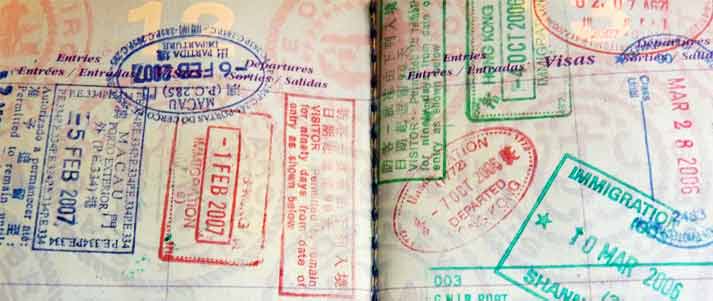9 tips for international students moving to the UK
We asked international students what they wished they'd known before coming to the UK. These are their top need-to-knows.

Credit: Ekaterina Pokrovsky – Shutterstock
Are you an international student coming to the UK to study? We know it can be overwhelming, especially if it's your first time at uni. Studies show that most overseas students are undergraduates, so there's a good chance you are too.
From visas and tuition fees to health insurance and bank accounts, there's a lot for international students to know about life in the UK. So, we've broken it down in this step-by-step guide.
International student checklist
Here are all the things you need to know about studying in the UK as an international student:
-
Plan your funding and research scholarships
Our first piece of advice for international students in the UK is to make sure you have the money to fund your degree.
The funding available to you depends on where you're from in the world and the date you start uni.
Previously, students from Europe were able to access Student Finance the same way UK students can. Then Brexit happened...
Other than in some limited cases, students from outside the EU have never been eligible for Student Finance in the UK.
If this is you, you'll have to fund your degree yourself. You'll also have to pay higher fees than what UK students pay. This could be anything from £11,400 – £67,892 a year depending on the type of course.
And don't forget: as part of your visa application, you'll need to provide evidence that you can cover this cost, as well as your living expenses.
If you don't have the money to pay for yourself, there are other options available. Our guide to international student funding and scholarships covers loads of funds you might be eligible for. You could also look into education loans or exchange programmes.
For more info, read our guide to tuition fees for international students.
Pre-2021 EU students, students from the EEA and Swiss students
From the academic year 2021/22 onwards, EU and EEA students were grouped with all other overseas students.
This means that, unless individual unis set their own fees for EU students, new (not continuing) EU/EEA students who started uni in the UK on 1st August 2021 or later must pay the same fees as students coming from outside Europe.
It's slightly different for EU/EEA students who enrolled at a UK uni before the academic year 2021/22. They are still eligible for Student Finance in the UK, so their tuition fees are covered by a loan. You can find more info in our guide to Student Finance for EU students.
-
Organise your student visa

Credit: Megan Eaves - Flickr
As an international student coming to the UK, you might need to apply for a visa.
If you're from a country outside the EU/EEA (excluding Switzerland), you've always needed a visa to study in the UK. And if you are from the EU/EEA and started studying after January 2021 you will need an international student visa too.
Short-term student visas
If you'll be studying in the UK for less than six months, you'll need a Standard Visitor visa. You can't work in the UK if you have this visa unless it's an elective (an optional placement as part of a medicine, dentistry or veterinary medicine course). If you want to work during your stay, you'll need to apply for a Student visa (more on this below).
You can also apply for a Short-term study visa if:
- Your course is between six and 11 months (but no longer)
- You're 16 or over
- You'll be studying an English language course. This means a course where you'll be learning about the English language, not just a course taught in English.
Standard Visitor visas cost £115 and Short-term study visas cost £200.
Long-term student visas
If your course lasts for longer than six months (or less than six months, but you want to work), you'll need a Student visa. This has replaced the Tier 4 Student visa.
These are some of the documents you'll need for your Student visa application:
- A valid passport or travel document
- Confirmation of Acceptance of Studies (CAS) – This is a 14-digit reference number you'll receive from your uni once you accept your offer.
- Proof of finances – You'll need to prove that you have enough money to pay for your first year of tuition fees. On top of this, you need to prove you have £1,023 (£1,334 for those studying in London) per month for up to nine months to cover your living expenses. This can either be through self-funding, an official sponsorship or an education loan.
- English language skills – You'll have to prove you meet the minimum level of English language proficiency, usually by taking a Secure English Language Test (SELT).
The Student visa costs £490 if you're applying for a new visa, want to extend your stay or switch to this visa.
You may have to pay a healthcare surcharge as part of your visa application. This costs £388 for six months or £776 for the whole year and allows you to use the NHS.
If you're applying for a student visa from outside the UK, you can apply up to six months before you start your course. You have three months if you're applying from inside the UK (and you must apply before your current visa expires).
You could get a response within a few weeks, but it's best to apply as soon as possible. Check out the government's website for a list of visa processing times for each country.
Pre-2021 EU students, students from the EEA and Swiss students
On 1st January 2021, things changed for students from the EU, the EEA and Switzerland coming to the UK.
Until 31st December 2020, these students didn't need a visa to live and study in the UK.
If you were living in the UK before 31st December 2020, you were able to apply to the EU Settlement Scheme. This allows you to work, study and access benefits and services on broadly the same basis as you could before Brexit.
-
Prepare for British life
Culturally, the UK is diverse and welcoming of people from all around the world. Universities have plenty of international students, and most have societies to help you meet like-minded people and those from similar backgrounds.
We also recommend searching for Facebook groups related to your uni. They often have groups specifically for international students in the UK, so you can discuss any questions you have and even make friends before you arrive.
In case you weren't aware, the UK is known for its cold and wet weather. Pack lots of warm clothes and a waterproof coat for the winter months, and don't expect summer to be too hot.
It's not student-budget (or eco) friendly to have the heating on all the time either (even with our tricks for saving on energy bills). So, warm clothes are essential.
-
Sort your student accommodation
Try to get your accommodation sorted before you land in the UK. The last thing you want is to turn up and have nowhere to stay.
Your first port of call should be your university itself. They generally offer guarantees to house all students who apply before a certain date.
Most students either live in uni accommodation (called 'halls of residence', or 'halls' for short) or rent a room from a private landlord.
Living in halls is best for your first year, as it removes the trouble of trying to find a suitable room elsewhere. Some unis have halls specifically for international students to help you make friends easily.
These are either self-catered (meaning you have access to a shared kitchen to cook your own meals) or catered (meaning your meals are provided at a canteen).
If you're looking to save some money, self-catered is by far the cheaper option. We have loads of student recipes and even a student meal plan to help you develop your culinary skills.
Unlike American universities, most rooms in halls and private housing are single occupancy. This means you have a whole room to yourself.
If you're not interested in halls, and you'd prefer to do the house hunt yourself, head to our student letting agents directory to find houses in your area. You should also read our guide to viewing student houses, so you know what to watch out for.
And if you're not sure where you want to live, check out our guide comparing student halls and student houses.
If you're moving away from home for the first time, see our guide to surviving shared living. -
Make sure you have health insurance

Credit: Francis Tyers - Wikimedia
International students need to prove they have health insurance to cover any healthcare they need while in the UK. This is how it's done:
You'll have to pay the health surcharge as part of your visa application. This gives you access to the NHS during your stay here.
Also, check any health insurance you already have. This may cover you while you're abroad.
However, neither the UK EHIC nor health surcharge covers expenses or losses incurred as a result of illness or injury. This means cancelled travel plans or lost course fees aren't covered.
Pre-2021 EU students, students from the EEA and Swiss students
If you're from the EU, the EEA or Switzerland and you came to the UK before 31st December 2020, you'll need a UK European Health Insurance Card (UK EHIC). This entitles you to free or reduced healthcare from the National Health Service (NHS) while you're in the UK.
If you don't have one, it's as simple as applying for one through your home country's national health insurance provider.
You can still access healthcare using your UK EHIC if you're an EU national who was living in the UK before the end of 2020. However, you should have applied to the EU Settlement Scheme (EUSS) to protect your right to free healthcare in the UK.
-
Set up a student bank account
If you're staying in the UK for longer than a few months, we recommend opening a bank account.
This makes it easier to pay bills and keep your money safe. It also helps you avoid the foreign currency charges you'd pay if you used a non-UK bank account to pay for things in Britain.
Opening a bank account can be a lengthy process, as banks need lots of information to verify your identity and credit rating.
Check whether you're able to get the ball rolling from your home country to save time. Also look into whether your current bank has any links to UK banks, as this should make the process smoother.
Student bank accounts are a great option, but not all banks offer these to international students.
Instead, check out our guide to the best UK international student bank accounts. Use our list as a starting point to find an account that suits you.
It can take a while to get a bank account set up, and around 10 days for your debit card to arrive. So, it's wise to take money with you to cover the first month of your stay. We'd recommend a prepaid card for this, as carrying large amounts of cash can be unsafe.
-
Work out the cheapest way to make international calls
If you're wondering whether your current phone will work in the UK, it typically depends on where you're coming from.
There are two types of cellular frequencies: the GSM band and the CDMA band.
The UK operates on the same GSM band as most of the world. But if you're coming from Japan or North/South America, this is worth looking into. If your phone only supports the CDMA band, there's a chance it won't work in the UK.
If your phone doesn't work here, it might be worth selling it for cash and buying a new one. Check out our guide to buying a refurbished phone for the best deals.
However, the worst thing you can do is keep your current SIM card while studying in the UK. You'll pay extremely high charges for calling abroad, as well as local numbers.
Save money calling local numbers
If you already have a mobile phone then you'll need a new SIM card.
With a Pay As You Go (PAYG) SIM, you'll need to top up your phone with credit. This is a good way to monitor your spending, but it's frustrating if your credit runs out at an awkward time.
Monthly contracts are often better value, as you'll usually get unlimited minutes and texts. What's more, you can get one-month rolling contracts. This means you can cancel your plan at short notice and move elsewhere. See our guide to the best SIM-only deals for more info.
Note that if you bought it back home, you may have to unlock your phone before you start using your new SIM card.
For calling back home
In recent years, lots of low-cost international call providers have emerged, such as Lebara, LycaMobile and RebTel.
Or, you can use services like Zoom, FaceTime and WhatsApp to have audio and video chats for free. Just remember, these rely on you having a WiFi or data connection.
Check out our guide on the cheapest ways to make international calls to compare.
Read our list of the best money-saving apps to save more with your smartphone. -
Figure out public transport

Credit Rept0n1x - Wikimedia
Using the public transport system when you first land in a country can be daunting. Here's a simple guide.
Local travel
All cities have a local bus service, which is often the best way of getting around. Figure out how far you're going to be living from campus, and whether it's worth buying a student bus pass to save money.
Bigger cities might have a subway system, like the Tube in London or the Metro in Newcastle. See if you can invest in a yearly pass to help keep costs down.
If you're confident enough, travelling by bike can help you save money while being eco-friendly too.
National travel
In the UK for the first time? You'll probably want to visit a few cities and sights while you're here. Your two main options are coach or train.
Trains are the quickest and comfiest way to travel through the UK. However, you should book tickets as early as possible to save money – check out our guide to saving on train fares.
You'll also want to buy a 16–25 Railcard or a 26–30 Railcard, which saves you a third on all rail fares. Given how cheap they are, and how expensive tickets can be, you could make your money back in a single journey.
Coaches are a cheaper alternative to trains, but they can take twice as long. Our top pick for saving money is megabus, with journeys starting at £2 between the major cities.
But if you can't find a suitable arrival and departure point, try National Express (the largest coach network in the UK). We also have an extensive guide on how to save on coach travel for you to check out.
Travelling by plane is an option for longer distances, but it can be expensive. Check out our list of tricks to help you save on flights.
-
Know the hours you're allowed to work
If you want to make money while you're studying, you need to know your options and rights to work in the UK. If you have EU-settled status. You are free to work as many hours as you wish and can work for as long as you want after graduation.
With your student visa, you'll be able to work up to 20 hours per week while studying. You can work full-time during the holidays, as well as before and after your course starts.
However, you shouldn't rely on a part-time job as your main source of income to fund your living costs in the UK.
They're a great way to boost your finances, but you're unlikely to earn enough to live. What's more, long shifts can distract you from your studies. Try applying for an international student scholarship instead.
See what part-time student jobs are available in your uni town.








